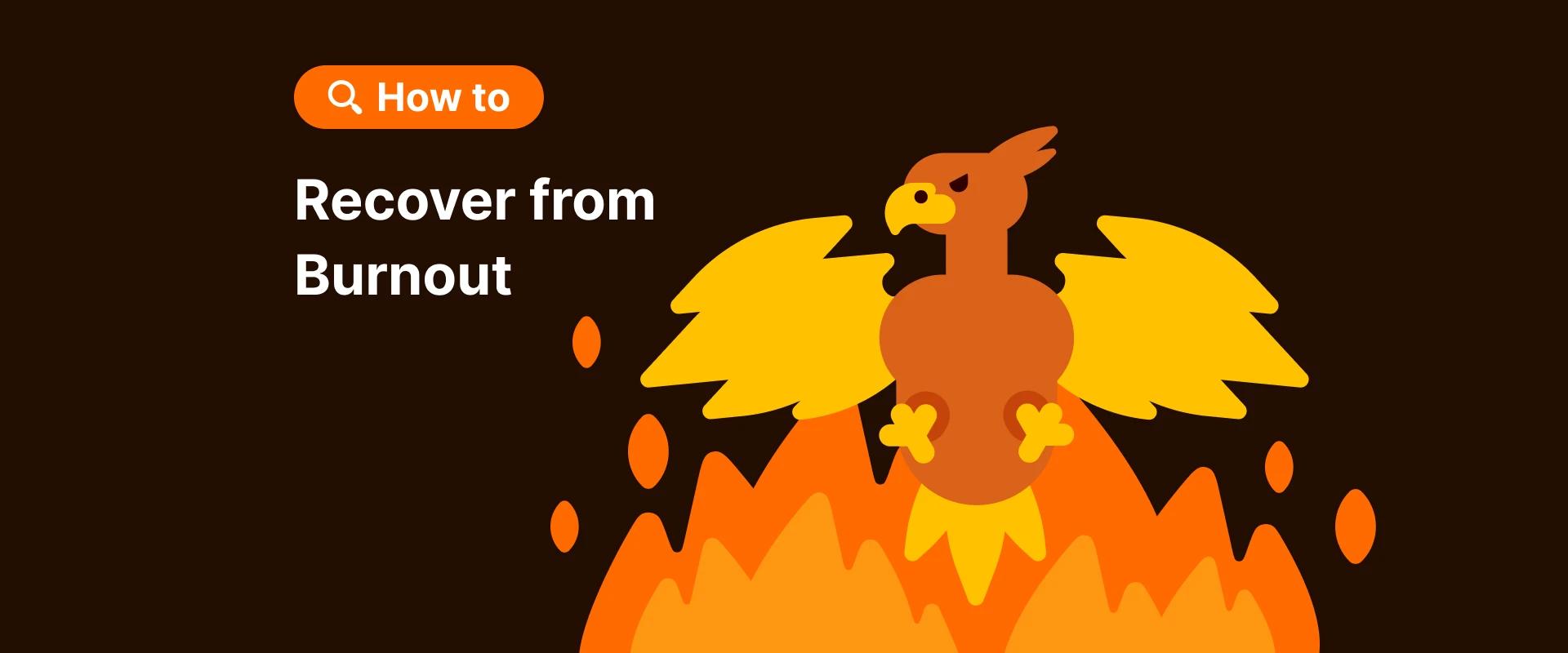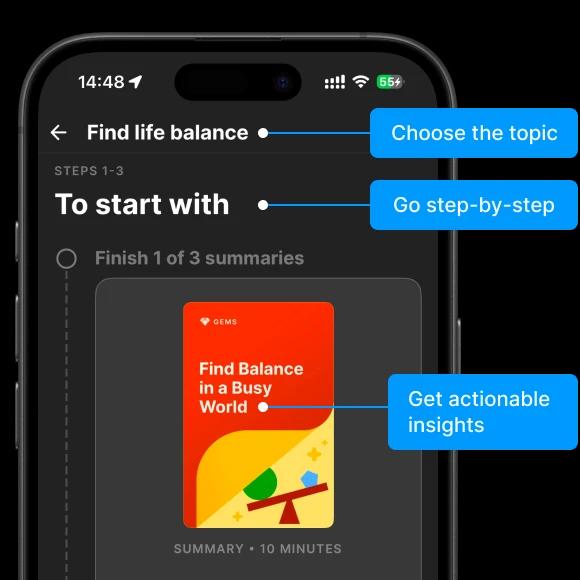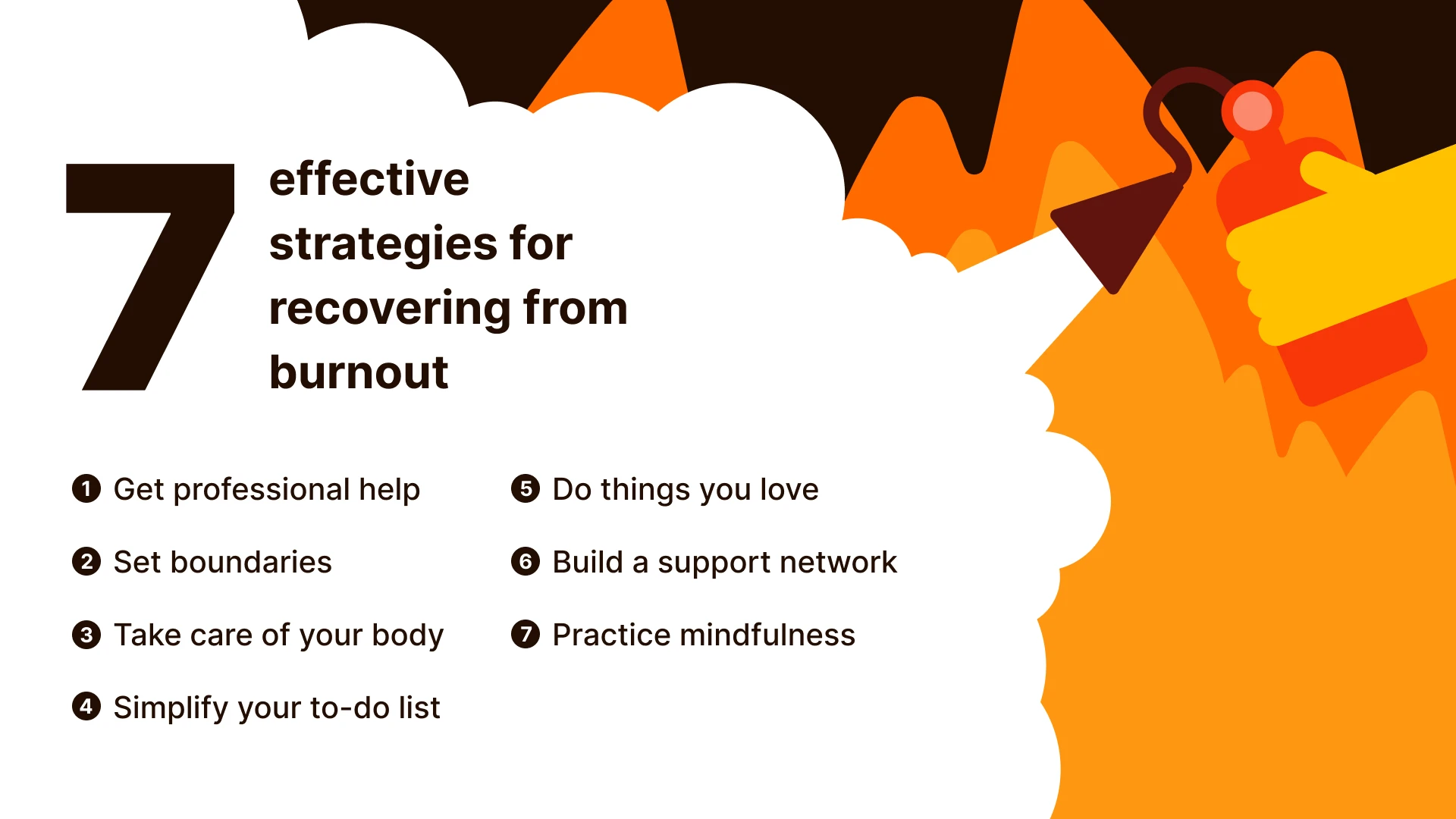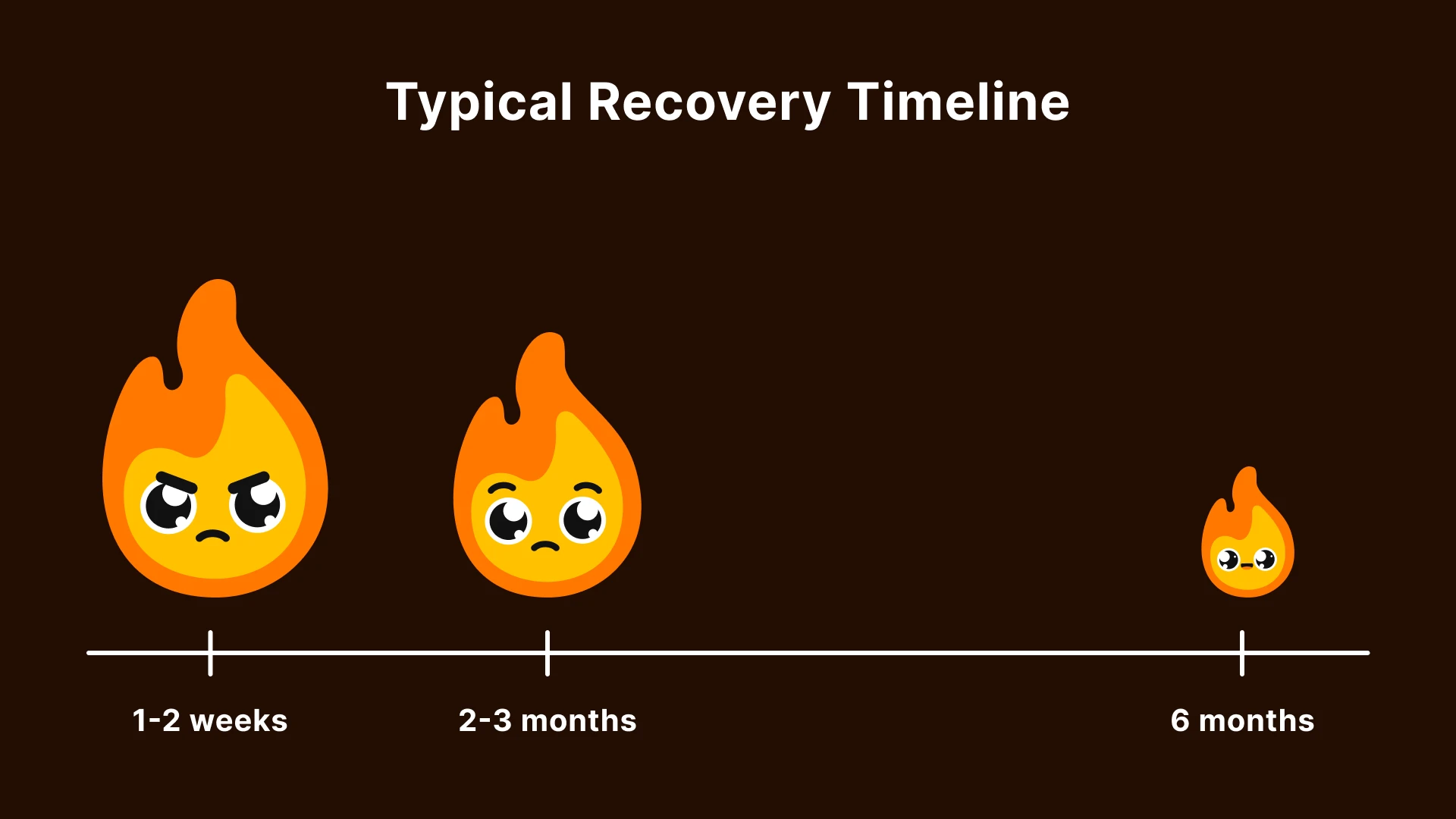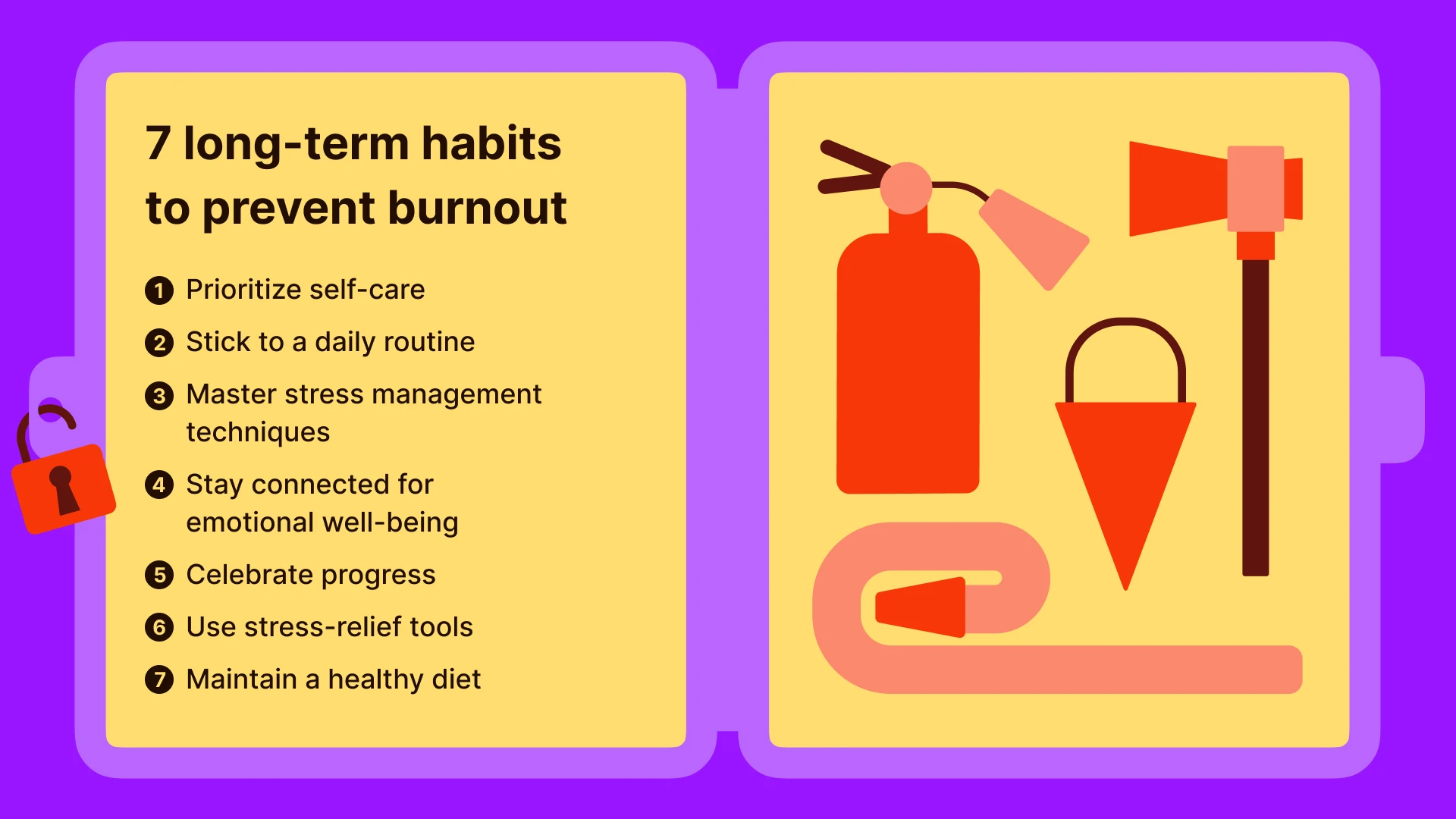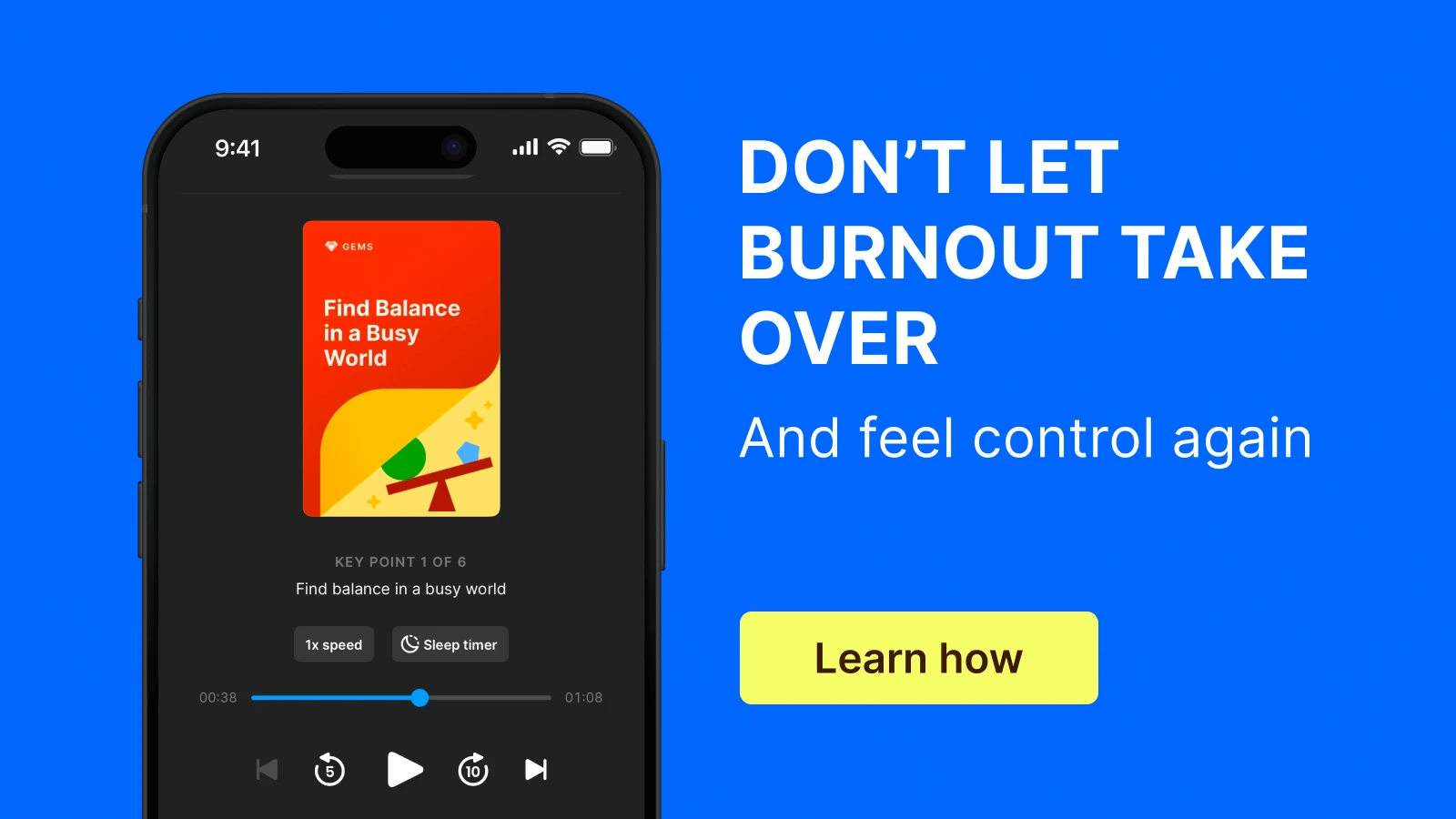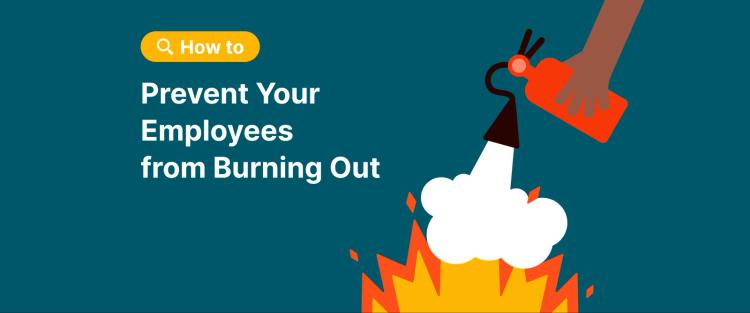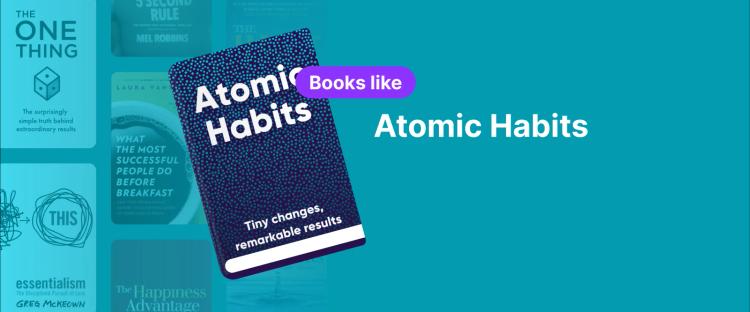Ever feel like no matter how much you rest, you wake up just as exhausted? You're not alone. According to the World Health Organization, workplace burnout affects millions globally, costing employers billions in lost productivity. It's not just about feeling tired — it's a kind of mental exhaustion that affects your whole body, mind, and emotions.
So, if you want to know how to recover from burnout, you need to understand what your body and mind truly need. Recovery is possible through proven strategies found in expert guides like Emily Nagoski's 'Burnout,' Brené Brown's 'The Gifts of Imperfection,' and James Clear's 'Atomic Habits.'
And the Headway app makes these insights accessible through bite-sized summaries, helping you master self-care, boundary-setting, and stress management in just 15 minutes a day. This microlearning tool transforms big ideas into actionable steps for your recovery journey.
Try Headway and get your personalized burnout recovery plan with proven expert tips!
Quick tips on how to recover from burnout:
Get professional support and practice body-based healing
Set firm boundaries and learn to say "no"
Build sustainable self-care habits
Simplify priorities and focus on what matters
Reconnect with activities that spark joy
Ready to start your recovery? Read on for the complete guide.
The seven effective strategies for recovering from burnout and regaining motivation
Recovering from burnout means caring for both your body and mind. Here are some simple strategies to help:
1. Get professional help to address root causes
Talk to a specialist trained in body-based healing who can help you figure out what's causing your burnout and guide your recovery.
These professionals can lead you through steps to address both physical and emotional exhaustion. Professional support can help you process emotional exhaustion and reconnect with your body.
2. Set boundaries that protect your energy
Learn to say no to energy-draining activities and protect your time for rest. Saying no can feel hard at first, but it's one of the most crucial steps in recovery.
To learn more about effective strategies to set boundaries with family, friends, and even co-workers, check out the following helpful resources.
3. Take care of your physical health
Focus on proper nutrition, gentle exercise like walking or stretching, and getting enough sleep. Simple body exercises like shaking off tension can help you feel better, and when your body feels better, your mind often follows.
However, if you struggle to establish working routines to care for your body, check out 'Atomic Habits' by James Clear.
It provides practical strategies for forming small, sustainable habits, such as stretching for five minutes in the evening or prepping healthy meals in advance, that can significantly affect how you feel.
4. Simplify your to-do list and focus on what matters
Instead of trying to do everything at once, focus on what truly matters and maintain a healthy work-life balance. As Greg McKeown emphasizes in 'Essentialism: The Disciplined Pursuit of Less,'
"If you don't prioritize your life, someone else will."
By breaking your goals into smaller, achievable steps and celebrating progress along the way, you can reduce stress and build momentum toward meaningful accomplishments.
5. Do things you love to reignite your purpose
Hobbies like drawing, gardening, or simply being outdoors fill your life with purpose. As Elizabeth Gilbert writes in 'Big Magic: Creative Living Beyond Fear:'
"A creative life is an amplified life."
Embracing curiosity and engaging in things you love can help you rediscover what makes life meaningful.
6. Build a support network that understands you
Surround yourself with understanding and supportive people, like family or close friends. Talking about your feelings can alleviate loneliness and provide emotional safety. As Brené Brown emphasizes in 'The Gifts of Imperfection,'
"Connection is why we're here; it is what gives purpose and meaning to our lives."
Leaning on a trusted support system during challenging times not only makes recovery easier but also strengthens the bonds that sustain you.
7. Practice mindfulness to stay present
Dedicate a few minutes daily to focus on your breathing or how your body feels. This practice can help you feel calm and present, and it can help you create a sense of peace in stressful situations. As Eckhart Tolle writes in 'The Power of Now,'
"Realize deeply that the present moment is all you ever have. Make the Now the primary focus of your life."
Burnout recovery isn't about doing more — it's about doing what helps you heal and feel like yourself again. Over time, these strategies can help you regain your motivation and energy.
Understanding burnout: Definition, cause, and risk groups
Burnout typically stems from prolonged stress exposure without adequate recovery time. It's often tied to high demands, lack of control, or feeling undervalued in work or personal life.
What is burnout?
Burnout is a state of complete physical, mental, and emotional exhaustion caused by chronic stress. It goes beyond feeling "off" or temporarily overwhelmed — it seriously impacts your body, mind, and emotions, often leaving you drained, detached, and unable to cope with daily demands.
Burnout can manifest in various ways, making it crucial to identify its warning signs early.
By understanding how burnout shows up in your life, you can take the first steps toward addressing it and regaining balance. Let's explore the common signs of burnout and how to recognize them.
What causes burnout?
Burnout typically stems from prolonged exposure to stress without enough time for recovery. It's often tied to high work demands, a lack of control over responsibilities, or feeling unappreciated.
Did you know that the World Health Organization recognizes job burnout as an occupational phenomenon caused by unmanaged work-related stress?
But burnout isn't limited to the workplace. Stressors in your personal life — such as caregiving, relationship conflicts, or unrealistic self-expectations — can also significantly contribute to it.
The pandemic amplified these challenges, especially for healthcare workers and caregivers who endured long hours and emotional strain. These pressures can trap your nervous system in survival mode, making relaxing or thoroughly enjoying life nearly impossible.
Who is at risk of burnout?
Burnout can happen to anyone, but some people are more likely to experience it:
People with high-stress jobs or responsibilities: Healthcare workers, teachers, caregivers, and parents often face extra demands and not enough time to care for themselves. These groups frequently give more to others than they can replenish.
Perfectionists and people who have trouble saying no: If you relentlessly push yourself, you might exhaust yourself. Perfectionism creates endless pressure by making you feel like nothing is ever good enough.
People who love what they do: If you don't care for yourself, you can still burn out, no matter how much you enjoy your work or hobbies. Loving your job doesn't protect you if you don't take time to recharge.
The good news is that noticing these risks early can help. Self-care, boundaries, and attention to how your body feels can lower your chances of burning out.
Being mindful of these risks can help you stay balanced and avoid reaching a breaking point.
Understanding who is most at risk of burnout highlights the importance of proactive measures to prevent it.
However, if you're already experiencing burnout, it's essential to focus on recovery strategies that can help you recover and rebuild your energy levels.
Let's delve into practical ways to address burnout and regain your motivation.
How to recognize the signs of burnout
Burnout can affect your mind and body, often creeping up subtly before becoming overwhelming. If burnout worsens, getting help from someone who can guide you through recovery is crucial.
The sooner you act, the quicker you can make a big difference. Here are some common indicators of burnout:
Emotional symptoms
Feeling irritated, having trouble focusing, or not caring about things you used to enjoy are red flags. Persistent fatigue or detachment from activities that once brought you joy are also red flags.Physical symptoms
Burnout can damage your body, weakening your immune system and increasing stress levels. You might experience frequent illnesses, headaches, or constant muscle tension. Even simple tasks like replying to emails or doing dishes can feel monumental.Physiological effects
Burnout keeps your nervous system in overdrive. You might stay in "fight-or-flight" mode (feeling on edge or restless) or "freeze" mode (feeling stuck or shut down). While these states help during stressful times, they become draining if they remain unresolved.
Recognizing the symptoms of burnout is a crucial first step, but it's equally important to distinguish burnout from other conditions like depression or anxiety.
Let's explore how burnout differs from these mental health challenges.
Difference between burnout, anxiety, and depression: How to tell them apart
What feels like burnout might be something else! Sometimes, feeling overwhelmed and stressed can look like burnout, but other things might cause it. For example:
Anxiety: This might show up as constant worrying, trouble relaxing, or feeling tense all the time. Anxiety can make you feel like your mind is always racing and that you can never quite relax.
Depression: You might feel hopeless, like nothing matters, even if nothing stressful is happening right now. Depression often might make you feel sad or empty, even during moments that should feel joyful.
Other health issues: Physical symptoms like being tired constantly, getting sick often, or having aches and pains could also result from vitamin deficiencies, thyroid problems, or sleep disorders. For example, sleep disorders like insomnia can mimic burnout symptoms.
If you're unsure about what's causing your symptoms, talking to a healthcare professional can help. They can figure out the root cause and help you feel better. Professionals can also rule out any medical issues that might need specific treatments.
How long does it take to recover from burnout? Your recovery timeline
It's ironic how often people ask, "Can you help me rest more productively so I can get back to work faster?" Recovery is not about getting back to work as quickly as possible — it's about giving yourself space to rest and heal. How long it takes depends on how bad the burnout is:
Initial rest (1–2 weeks): Take a step back from stress. Focus on sleeping well, eating healthy meals, and doing gentle activities like walking or yoga. Performing relaxation exercises, such as deep breathing or feeling your feet firmly on the ground, can help calm your mind. These steps allow your body to begin its recovery process.
Reflection and rebuilding (2–3 months): Identify the root causes of your burnout. Start setting limits on what you take on, simplify your schedule, and spend time with supportive friends and family. Physical movement, whether dancing or stretching, helps release tension and increase body awareness. Rebuilding involves learning to say no and prioritizing what truly matters to you.
Long-term resilience (6 months or more): Start building habits that help you stay balanced. Regular exercise and physical activity, mindfulness, and staying close to loved ones are essential. Exercises like deep breathing or paying attention to your surroundings can help keep your stress levels low over time. Long-term resilience means creating a life where rest and activity are balanced.
The recovery process can take a while, but it's worth it. Be patient with yourself and focus on taking small steps every day. Each small change helps you move closer to feeling healthy and whole again.
How do you mentally reset after burnout?
Mentally resetting after burnout begins with slowing down and permitting yourself to rest. First, let go of any guilt — burnout isn't a failure; it's your body and mind signaling that they need care.
Reflect on what truly matters to you and identify areas where you can simplify, delegate, or completely let go of responsibilities that no longer serve you.
Somatic practices help reconnect with your body and regulate your nervous system. Simple grounding exercises help you stay anchored in the present moment. Try focusing on your breath or noticing sensations in your feet.
Journaling can also be a powerful way to process emotions and explore the underlying causes of burnout. Writing down your thoughts and feelings helps you uncover patterns, reflect on your needs, and create a plan for moving forward sustainably.
Incorporating somatic, mindfulness, and gratitude practices can help you focus on the positive aspects of your life and rebuild motivation and resilience.
Incorporating somatic, mindfulness, and gratitude practices can help you focus on the positive aspects of your life and rebuild motivation and resilience.
Above all, be patient with yourself. Recovery is a gradual process that requires self-compassion and time. Trust that small, intentional steps can lead to lasting change.
The six lifelong habits to prevent burnout
The best way to prevent burnout is to build habits that keep your body and mind healthy. Here are some ideas:
Prioritize self-care
Make time for activities that help you relax, like yoga, drawing, or spending time with friends in your daily life.Think of self-care as something you need, not just a treat. Self-care helps recharge your energy.
Stick to a daily routine
Regular exercises, balanced meals, healthy sleeping habits are the type of routines that help you create the structure you need to maintain your overall quality of life.
Master stress management techniques
Effectively managing stress is critical to achieving balance. Simple techniques such as diaphragmatic breathing, regular exertion, and mindfulness can help lower your stress levels. These skills will allow you to stay calm and collected, even when times are difficult.
Stay connected to support your emotional health
Spend more time with supportive people such as family members or trusted friends. Although it may be difficult, sharing how you feel with someone you trust rather than suppressing your feelings and isolating yourself from your friends is a way to feel emotionally safe, and it may lessen the feeling of loneliness.
Celebrate progress
Even small wins, like finishing a task or taking a break, are worth celebrating after you experience burnout and recover from it. They help you feel good about what you've done. Small victories build confidence!
Maintain a healthy diet
Eating healthy foods can also prevent burnout. Fueling your body with wholesome foods — like fresh fruits, vegetables, lean proteins, and whole grains — helps stabilize energy levels and supports overall emotional well-being.
Cut down on caffeine and sugar because they lead to energy crashes, and stay hydrated to keep your mind and body functioning optimally.
Start your recovery journey with Headway book summaries
Burnout recovery requires time, effort, and the right tools. Each small change helps you move closer to your healthy and whole self again. You can reclaim your energy and motivation with personalized recovery strategies.
The Headway app is your invaluable resource if you're seeking guidance on this journey. With bite-sized summaries of books by top experts, the app gives you practical insights on how to recover from burnout and bounce back fast.
From learning about stress management techniques to understanding how to set boundaries, Headway offers knowledge that empowers you to take control of your well-being.
Download Headway and take the first step toward regaining life balance today!
FAQs
What is the final stage of burnout?
The final stage of burnout involves complete physical and emotional collapse, where you can no longer function in daily activities. At this stage, you may experience severe health issues, chronic fatigue, and inability to work or maintain relationships. This stage requires immediate professional intervention and extended rest. Recovery becomes more challenging, making early intervention crucial.
What exercise is best for burnout?
Gentle, low-impact exercises work best for burnout recovery. Walking, yoga, tai chi, and stretching help release physical tension without adding stress. These activities support nervous system regulation and body awareness. Start with just 10-15 minutes daily and gradually increase as energy returns. Listen to your body and avoid intense workouts that could worsen exhaustion.
What does severe burnout look like?
Severe burnout manifests as complete physical and emotional exhaustion, chronic illness, inability to concentrate, emotional numbness, and detachment from everything. You might struggle with basic tasks like getting out of bed or preparing meals. Physical symptoms include persistent pain, headaches, and weakened immunity. Severe burnout requires professional help and significant lifestyle changes for recovery.
Is 2 months enough to recover from burnout?
Not always. Recovery from burnout can take 3-6 months or longer, depending on its severity and causes. You can rest your body in weeks, but resilience takes time and effort over months. The focus is on small, consistent steps and patience over trying to rush back to your full capacity as quickly as possible.
Can taking a break help me with burnout?
Yes, taking a break is often essential for burnout recovery. Time away from stressors allows your nervous system to reset and your body to heal. However, breaks work best when combined with addressing root causes—like poor boundaries or unsustainable workloads. A break alone won't prevent burnout from returning if underlying issues remain unaddressed.
How much sleep do I need to recover from burnout?
During burnout recovery, aim for 8-10 hours of quality sleep nightly, possibly more initially. Your body needs extra rest to repair physical and emotional exhaustion. Prioritize consistent sleep schedules, create a calming bedtime routine, and avoid screens before bed. If sleep difficulties persist despite good habits, consult a healthcare professional to rule out sleep disorders.

